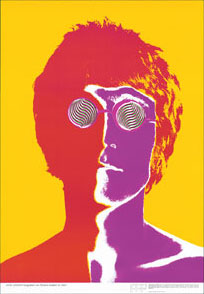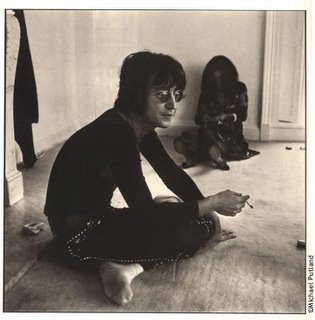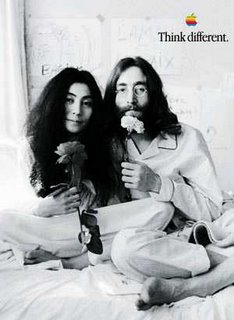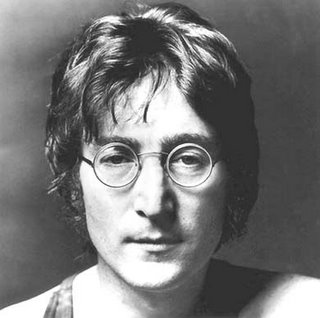Jhon Lennon
 John Winston Lennon (later John Winston Ono Lennon) (October 9, 1940 – December 8, 1980) was best known as a singer, songwriter, poet and guitarist for the British rock band The Beatles. Jhon Lennon creative career also included the roles of solo musician, political activist, artist, actor and author. As half of the legendary Lennon-McCartney songwriting team, he heavily influenced the development of rock music, leading it towards more serious and political messages.
John Winston Lennon (later John Winston Ono Lennon) (October 9, 1940 – December 8, 1980) was best known as a singer, songwriter, poet and guitarist for the British rock band The Beatles. Jhon Lennon creative career also included the roles of solo musician, political activist, artist, actor and author. As half of the legendary Lennon-McCartney songwriting team, he heavily influenced the development of rock music, leading it towards more serious and political messages.Jhon Lennon is recognized as one of the greatest music icons of the 20th century and many of his songs, such as "Imagine" and "Strawberry Fields Forever", are often ranked among the best songs in popular music history. In 2002, the BBC conducted a vote to discover the 100 Greatest Britons of all time, and the British public voted Lennon into 8th place.
Jhon Lennon Youth
Lennon was born in Liverpool 9 October 1940. Both of his parents had musical backgrounds and experience, though neither pursued them seriously. Lennon lived with his parents in Liverpool until his father Alfred (nicknamed Alf, and later "Freddy"), a merchant seaman, walked out on the family when John was five years old. (John later met with his father during his musical career) His mother Julia (under pressure from the local authorities) decided that she was unable to care for her son, and so gave him to her sister Mimi. Lennon lived with Aunt Mimi and her husband George at Mendips, 251 Menlove Avenue, Liverpool throughout the rest of his childhood and adolescence.
Like much of the population of Liverpool, Lennon had some Irish heritage. His grandfather, James Lennon, was born in Dublin in 1858, and his grandmother Mary (née Maguire), was Irish-born as well. John Lennon's mother Julia (née Stanley) was of Welsh descent. Although he had little exposure to his Irish heritage growing up, he came to identify with it later in life. He lived in the working class section of Liverpool, from where the Beatles emerged.
Lennon developed severe myopia as he grew up, and was obliged to wear glasses in order to see clearly. During his early Beatle career, Lennon wore contacts or prescription sunglasses (or simply "toughed it out" without them). In 1966, on the set of How I Won The War, Lennon was issued a pair of National Health spectacles. He continued to wear these round, wire-rimmed glasses which became part of his iconic public image.
Although John lived apart from his mother, he still kept in contact with her through regular visits, and during his younger years Julia cultivated his lifelong interest in music by teaching him how to play the banjo. She had actually learned the instrument from John's father when they were dating, and when John began to play guitar, he started out playing the same four-string chords, leaving the bass strings untuned. It wasn't until Paul McCartney entered John's life that John began to learn proper guitar chords.
On 15 July 1958, when John was 17, Julia was killed after being struck by a car driven by a drunk off-duty police officer. John had to go to the morgue to identify her body. Julia's death was one of the factors that cemented his friendship with McCartney, who had lost his own mother to breast cancer in 1956, when he was 14. The time of his mother's death was a very emotionally depressing time. Years later, Lennon wrote the songs "Julia", "Mother" and "My Mummy's Dead" regarding his mother, as well as naming his firstborn son, Julian, after her.
Though failing in grammar school, Lennon was accepted into the Liverpool College of Art with help from his school's headmaster and his Aunt Mimi. It was there that he met his future wife, Cynthia Powell. Lennon would steadily grow to hate the conformity of art school, which proved to be little different from his earlier school experience, and ultimately dropped out. He instead devoted himself to music, inspired by American Rock 'n' Roll and singers like Elvis Presley, Chuck Berry, Buddy Holly and Little Richard. He had started a skiffle band in grammar school called the Quarry Men (after his alma mater, Quarry Bank). With the addition of Paul McCartney and George Harrison, the band changed to playing rock 'n' roll, taking the name "Johnny and the Moondogs", followed by "The Silver Beetles" (a tribute to Buddy Holly's Crickets), which was later shortened to The Beatles. He married Powell in 1962, after she became pregnant with Julian.
Jhon Lennon Role in The Beatles
Lennon had a profound influence on rock and roll and in expanding the genre's boundaries during the 1960s. He is widely considered, along with songwriting partner Paul McCartney, as one of the most influential singer-songwriter-musicians of the 20th century. Many of the songs written exclusively or primarily by Lennon, however, are more introspective — often in the first person — and more personal than McCartney's. His most surreal pieces of songwriting, "Strawberry Fields Forever" and "I Am the Walrus", are fine examples of his unique style. Lennon's partnership in songwriting with McCartney many times involved him in complementing and counterbalancing McCartney's upbeat positive outlook with the other side of the coin, as one of their songs, "Getting Better" demonstrates:
The Break-up of The Beatles
 The failed Get Back/Let It Be recording/filming sessions did nothing to improve relations within the band. After both Lennon and Ono were injured in the summer of 1969 in a car accident in Scotland, Lennon arranged for Ono to be constantly with him in the studio (including having a full-sized bed rolled in) as he worked on The Beatles' last album, Abbey Road. While the group managed to hang together to produce one last superior musical work, soon thereafter business issues related to Apple Corps came between them.
The failed Get Back/Let It Be recording/filming sessions did nothing to improve relations within the band. After both Lennon and Ono were injured in the summer of 1969 in a car accident in Scotland, Lennon arranged for Ono to be constantly with him in the studio (including having a full-sized bed rolled in) as he worked on The Beatles' last album, Abbey Road. While the group managed to hang together to produce one last superior musical work, soon thereafter business issues related to Apple Corps came between them.Lennon decided to quit The Beatles but was talked out of saying anything publicly. Phil Spector's involvement in trying to revive the Let It Be material then drove a further wedge between Lennon (who supported Spector) and McCartney (who opposed him). Though the split would only become legal some time later, Lennon and McCartney's partnership had come to a bitter end. McCartney soon made a press announcement, declaring he had quit The Beatles, and promoting his new solo record.
In 1970 Jann Wenner recorded an inteview with Lennon that was played on BBC in 2005. The interview reveals his bitterness towards Paul McCartney and the hostility of the other members towards Yoko Ono. Lennon said: "One of the main reasons the Beatles ended is because . . . I pretty well know, we got fed up with being sidemen for Paul. After Brian [Epstein] died we collapsed. Paul took over and supposedly led us. But what is leading us when we went round in circles? Paul had the impression we should be thankful for what he did, for keeping The Beatles going. But he kept it going for his own sake."
Jhon Lennon Solo career
John Lennon, early 1970; his Beatle locks shorn - as were Yoko's - for a charity auction.
John Lennon, early 1970; his Beatle locks shorn - as were Yoko's - for a charity auction.
 Of the four former Beatles, Lennon had perhaps the most varied recording career. While he was still a Beatle, Lennon and Ono recorded three albums of experimental and difficult electronic music, Unfinished Music No.1: Two Virgins, Unfinished Music No.2: Life with the Lions, and Wedding Album. His first 'solo' album of popular music was Live Peace in Toronto 1969, recorded in 1969 (prior to the breakup of The Beatles) at the Rock 'n' Roll Festival in Toronto with The Plastic Ono Band, which included Eric Clapton and Klaus Voormann. He also recorded three singles in his initial solo phase, the anti-war anthem "Give Peace a Chance", "Cold Turkey" (about his struggles with heroin addiction) and "Instant Karma!"
Of the four former Beatles, Lennon had perhaps the most varied recording career. While he was still a Beatle, Lennon and Ono recorded three albums of experimental and difficult electronic music, Unfinished Music No.1: Two Virgins, Unfinished Music No.2: Life with the Lions, and Wedding Album. His first 'solo' album of popular music was Live Peace in Toronto 1969, recorded in 1969 (prior to the breakup of The Beatles) at the Rock 'n' Roll Festival in Toronto with The Plastic Ono Band, which included Eric Clapton and Klaus Voormann. He also recorded three singles in his initial solo phase, the anti-war anthem "Give Peace a Chance", "Cold Turkey" (about his struggles with heroin addiction) and "Instant Karma!"Following The Beatles' split in 1970, he released the John Lennon/Plastic Ono Band album, a raw, brutally personal record, heavily influenced by Arthur Janov's Primal therapy, which Lennon had undergone previously. The influence of the therapy, which consists literally of screaming out one's emotional pain, is most obvious on the songs "Mother" ("Mama don't go!/Daddy come home!") and "Well Well Well." The centrepiece is "God," in which he lists all the things he does not believe in, ending with "Beatles". Many consider "Plastic Ono Band" to be a major influence on later hard rock and punk music. Lennon continued this effort to demythologize his old band with a long, confrontational interview published in Rolling Stone magazine.
This was followed in 1971 by Imagine, his most successful solo album, which alternates in tone between dreaminess and anger. The title track has become an anthem for anti-war movements, and was matched in image by Lennon's "white period" (white clothes, white piano, white room, etc).
Perhaps in reaction, his next album, Some Time in New York City, was loud, raucous, and explicitly political, with songs about prison riots, racial and sexual relations, the British role in the sectarian troubles in Northern Ireland, and his own problems in obtaining a United States Green Card. This record is generally seen as the nadir of Lennon's career, full of heavy-handed and simplistic messaging not redeemed by much artistic value. Lennon had been interested in left-wing politics since the late 1960s, and was alleged to have given donations to the Trotskyist Workers Revolutionary Party [3]. It was during the period of the recording of this album that his links to this group were perhaps at their strongest. On 30 August 1972 Lennon and his backing band Elephant's Memory staged two benefit concerts at Madison Square Garden in New York; it was to be his last full-length concert appearance. Lennon and Ono also did a week-long guest co-host stint on the Mike Douglas Show, in an appearance that showed Lennon's wit and humour still intact.
In 1972, Lennon released an anti-sexism song, "Woman Is the Nigger of the World", implying that as black people were discriminated against in some countries, so were women globally. Radio refused to broadcast the song, and it was banned nearly everywhere, although he managed to play it to television viewers during his second appearance in the The Dick Cavett Show.
Lennon rebounded in 1973 with Mind Games, which featured a strong title tune and some vague mumblings about a "conceptual country" called "Nutopia", which satirized his ongoing immigration case. His most striking song of that year was the wry "I'm the Greatest," which he wrote for Ringo Starr's very successful Ringo album.
In 1973, Lennon's personal life fell into disrepair when Yoko kicked John out of the house. Yoko approached May Pang, their personal assistant at the time, with a unique proposal. Yoko, who thought May Pang to be an "ideal companion" for John, asked her to "be with John and to help him out and see to it that he gets whatever he wanted." John and May soon moved to Los Angeles which had been dubbed the "lost weekend" though it lasted until the beginning of 1975. During their time together, May encouraged John to spend time with his son, Julian Lennon, and became friends with Cynthia Lennon. Though John's public drunkenness had been the subject of gossip during 1974, Pang wrote that John was usually sober in his private life and created a large body of work.
 Despite alleged episodes of drunkenness, Lennon put together the well-received album, Walls and Bridges, which featured a collaboration with Elton John on the up-tempo number one hit "Whatever Gets You Thru the Night". Another top ten hit from the album was the Beatlesque reverie "#9 Dream". Lennon capped the year by making a surprise guest appearance at an Elton John concert in Madison Square Garden where they performed "Lucy in the Sky with Diamonds", "Whatever Gets You Thru the Night" and "I Saw Her Standing There" together. It was to be his last-ever concert appearance.
Despite alleged episodes of drunkenness, Lennon put together the well-received album, Walls and Bridges, which featured a collaboration with Elton John on the up-tempo number one hit "Whatever Gets You Thru the Night". Another top ten hit from the album was the Beatlesque reverie "#9 Dream". Lennon capped the year by making a surprise guest appearance at an Elton John concert in Madison Square Garden where they performed "Lucy in the Sky with Diamonds", "Whatever Gets You Thru the Night" and "I Saw Her Standing There" together. It was to be his last-ever concert appearance.In 1975, Lennon released the Rock 'n' Roll album of cover versions of old rock and roll songs of his youth. This project was complicated by Phil Spector's involvement as producer and by several legal battles; the result received generally negative reviews, though it yielded a powerful, lauded cover of "Stand by Me".
John Lennon and Yoko Ono in one of their last photo shoots, 21 November 1980
John Lennon and Yoko Ono in one of their last photo shoots, 21 November 1980
At this point Yoko was pregnant with what would be their first child, and Lennon — saddened by the fact that due to Beatlemania he had never gotten to experience fatherhood with his first son Julian — retired from music and dedicated himself to family life. This was made easier in 1976 when his US immigration status was finally resolved favourably, after a years-long battle with the Nixon administration that included an FBI investigation involving surveillance, wiretaps, and agents literally following Lennon around as he travelled. Lennon claimed the investigation was politically motivated.
Also in 1975, David Bowie achieved his first US number one hit with "Fame", co-written by Bowie, Lennon (who also contributed backing vocals) and Carlos Alomar.
Lennon's retirement, which he began following the birth of his second son, Sean in 1975, lasted until 1980 when Lennon, for the first time in five years, picked up his guitar again. At first only curious to see if he could still write music, he felt refreshed and full of ideas, completely reinvigorated by the experiences of fatherhood and the long break from the business. He wrote an impressive amount of material during a Caribbean vacation and began thinking about a new album. For this comeback, he and Ono produced Double Fantasy, a concept album dealing with their relationship. The name came from a flower Lennon saw at an exposition; he liked the name, and thought it was a perfect description of his marriage to Yoko. "(Just Like) Starting Over" began climbing the singles charts, and Lennon started thinking about a brand new world tour. Lennon also commenced work on Milk and Honey which he would leave unfinished. It was some time before Ono could bring herself to complete it.
Towards the end of his life, Lennon expressed his displeasure with the scant credit he was given as an influence on George Harrison in the latter's autobiography I Me Mine. According to Yoko, he was also unhappy that Paul McCartney's Beatles songs, such as "Yesterday", "Hey Jude" and "Let It Be" were more covered than his own contributions.
Pseudonyms
Throughout his solo career, Lennon appeared on his own albums (as well as those of other artists like Elton John) under such pseudonyms as Dr Winston O'Boogie, Mel Torment (a play on singer Mel Tormé), and The Reverend Fred Gherkin. He and Ono (as Ada Gherkin and other sobriquets) also travelled under such names, thus avoiding unwanted public attention.

0 Comments:
Post a Comment
<< Home